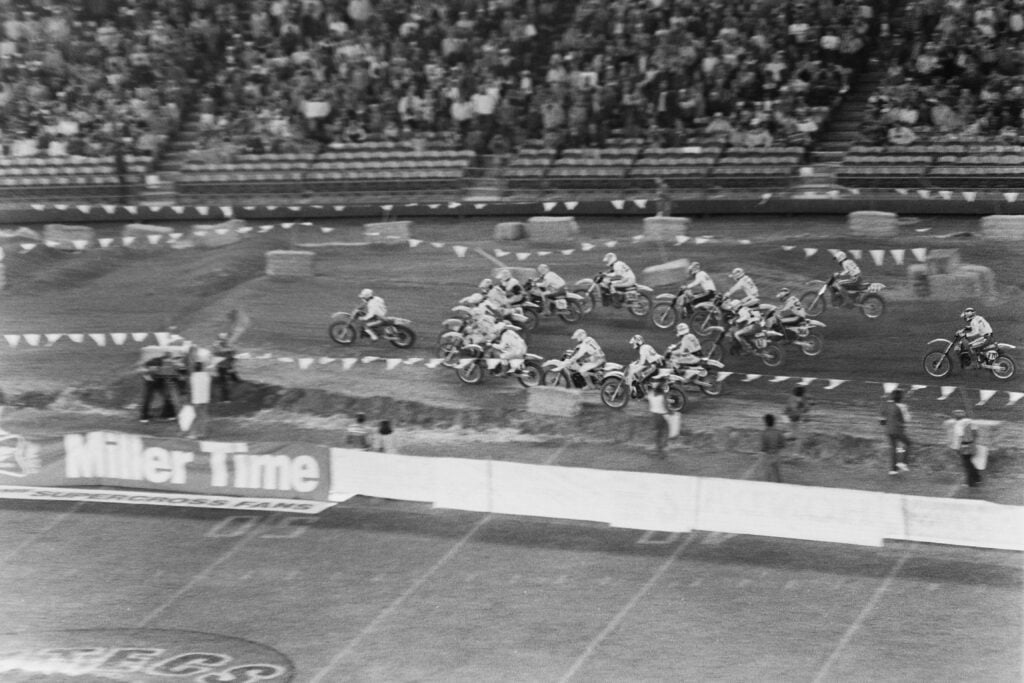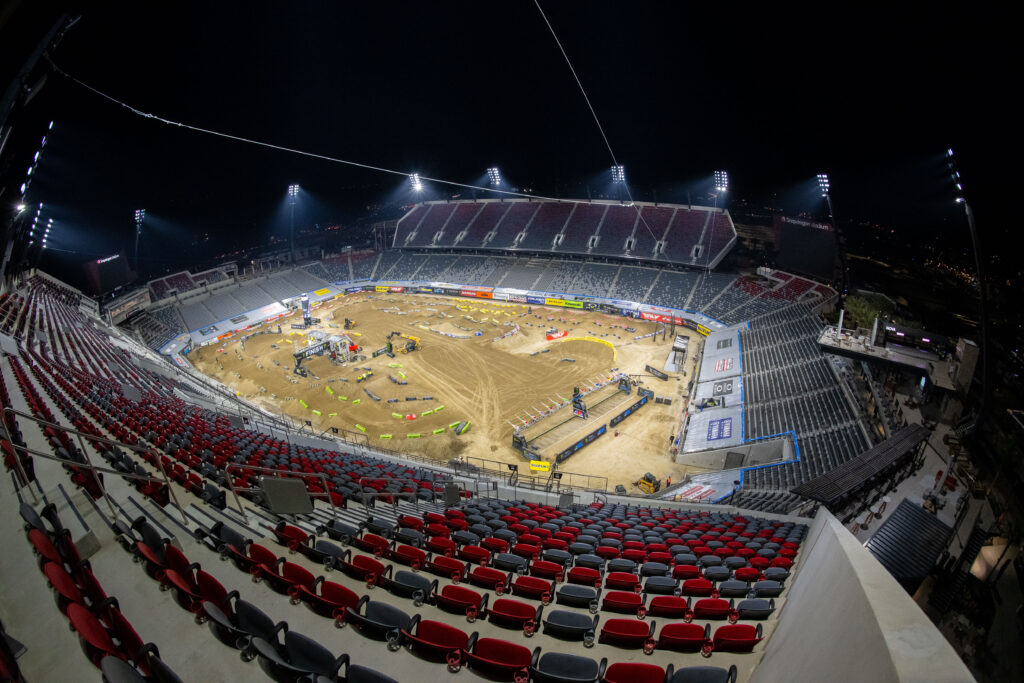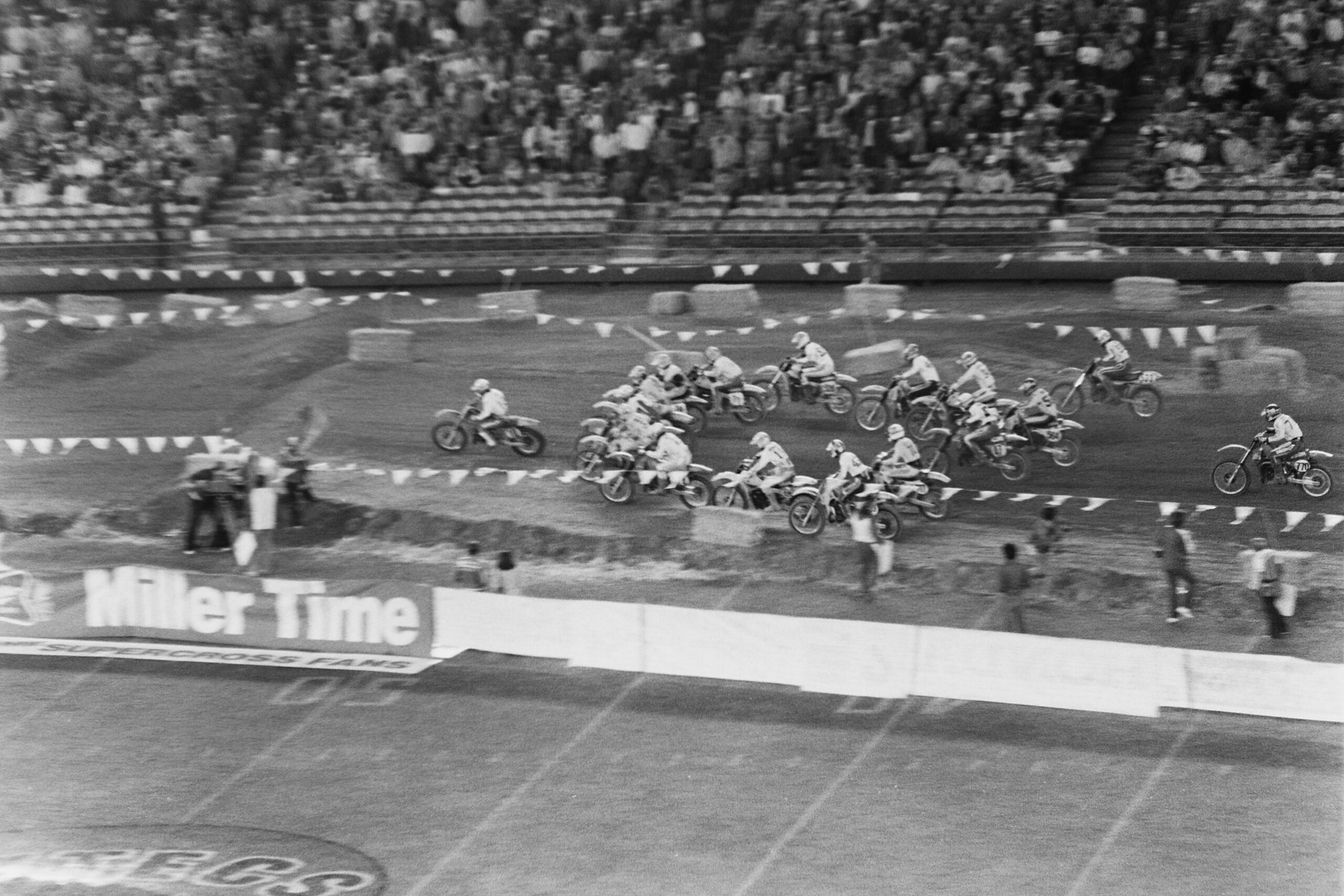Blast From the Past
“San Diego Rings in New Era”
By Broc Bridges
In 50 years of Supercross there have been multiple defining eras that shaped the future of the sport into what it is today. In the early 1970s Supercross was created culminating in the 1974 “Yamaha Super-Series” which is credited as the first points-paying season, with Pierre Karsmakers taking the maiden crown. Shortly after, Bob Hannah took over the Supercross world with three straight titles to end the 1970s. Riders like Mark Barnett, Mike Bell, David Bailey, and Johnny O’Mara brought the 80s in with a lot of fanfare and the sport had completely taken off. In 1984 the series suffered a short-lived split from the AMA and a larger, SMX-style Championship was created. One year later, the AMA was back running the series, making large-scale changes to welcome a new era in the sport defining what Supercross is to this day.
One of the changes implemented was not popular and did not last beyond 1985. Moving Supercross to a two-moto format did not go over well with fans who were used to a single, exciting Main Event determining the round’s winner. Motocross has always used the multiple-moto format and works better in the outdoor series than it did in Supercross. Fans had trouble keeping up with who was winning the overall, along with a confusing point-standings system. The series would move on from this style after 1985 and create a modernized Heat Race, Semi-Final, LCQ format with points only being awarded in the Main Events, as it is to this day (except for the Semi-Final races which were scrapped from 2007-2013 and again in 2018).
Despite the unpopular two-moto format, the 1985 season was one of the most exciting and closely contested Championship battles the sport has ever seen. Jeff Ward garnered the Championship by only two-points over Broc Glover, six-points over Ron Lechien, 18-points over Rick Johnson, and 22-points over O’Mara. In the 11-round series Ward only won one overall but suffered just a single moto outside of the top-10 yielding him the advantage over his competitors that had suffered multiple disastrous motos. San Diego’s Jack Murphy Stadium opened this spectacular season with O’Mara taking the overall with a 2-2 result and eventual Champion Ward scoring a lackluster 6-5 result. It was only the fourth AMA-sanctioned San Diego Supercross at the time. In 2023 the new Snapdragon Stadium hosted the city’s 40th round of 450SX Class racing and are set to host their 41st in 2024.

1982 San Diego Supercross at Jack Murphy Stadium. Photo Credit: Racer X Magazine
While the two-moto format was not a popular switch, there was another huge, extremely popular change coming to Supercross in 1985 – the implementation of the 125cc Support Class (now called 250SX Class) that would be divided into an Eastern and Western Regional. The series wouldn’t use the two-moto format and became immediately popular to Supercross fans. Motocross has always held a 125cc (now 250 Class) Championship so this move was an easy decision, partially credited to Dave Coombs Sr. who is still the namesake of the season ending Showdown between the athletes of both Regional Championships. The new series would run alongside the Premier Class meaning the 1985 Opener in San Diego was the first ever 250SX Class race.
The first ever 250SX Class race ended up being a great start to what is now an integral part of the sport. Brian Manley and Bobby Moore won their respective Heat Races, and the field was set for the first ever Main Event. Current Western Regional 250SX Class racer Max Vohland’s uncle Tyson Vohland nabbed the first Hole Shot ever on his Kawasaki, the same brand Max is currently running in 2024. Moore, who by season’s end was the first ever Western Regional Champion, was behind him, but fell back to fourth early in the race and finished in that position. It was the Kawasaki trifecta of Bader Manneh, Vohland, and Todd Campbell leading the way at the half-way point. Manneh and Vohland fell victim to the Jack Murphy Sand Pit giving Campbell the large lead and first ever 250SX Class victory. Vohland and Trampas Parker would finish on the podium to give Kawasaki a podium-sweep and are still the 250SX Class’ leading brand with 187 victories, 36 more than Honda who are a distance second. The podium sweep was the first of only 11 250SX Class podium sweeps in its history, which Kawasaki has done a record six times. There were no podium sweeps from Round 10 2014 (Daytona, Kawasaki) through last season’s Round 14 (East Rutherford, Honda).
Unlike the 1985 Premier Class’ two-moto format, the 250SX Class stood the test of time and San Diego 2024 will be the 611th round of what is now called 250SX Class racing. The 250SX Class series started churning out Premier Class Champions in 1993 when Jeremy McGrath took the title in his rookie year after winning the Western Regional Championship in 1991-1992. Since then the path to a 450SX Class factory ride is clear- win a 250SX Class Championship: Star Yamaha- Eli Tomac (2012 SX West), Cooper Webb (2015-2016 SX West), & Justin Cooper (2021 SX West); HRC Honda- Jett Lawrence (2022 SX East, 2023 SX West) & Hunter Lawrence (2023 SX East); Progressive Insurance Suzuki- Ken Roczen (2013 SX West); TLD GasGas- Justin Barcia (2011-2012 SX East); Rockstar Husqvarna- Malcolm Stewart (2016 SX East) & Christian Craig (2022 SX West); Red Bull KTM- Chase Sexton (2019-2020 SX East) & Aaron Plessinger (2018 SX West); Monster Energy Kawasaki- Jason Anderson (2014 SX West); Liquid Moly Beta- Colt Nichols (2021 SX East). Monster Energy Kawasaki’s Adam Cianciarulo and Liquid Moly Beta’s Benny Bloss are the only examples of factory riders without a 250SX Class title, with the former having won a 250 Class Motocross title.

2024 Monster Energy Supercross Round 3 San Diego race track at Snapdragon Stadium. Photo Credit: Feld Motor Sports, Inc.
McGrath started the new era of Supercross when he became the first dominant force with 72 victories and seven titles. Ricky Carmichael, James Stewart, and Chad Reed ushered in the 2000s winning every title from 2001-2009. Ryan Dungey and Ryan Villopoto were the next era, and it is safe to say Supercross is in its seventh era starting in 2018 after Dungey retired. No previous era had more to do with the growth of the sport than the early 80s where trial and error prevailed and younger riders were able to hone their skills before moving up to the Premier Class. Jack Murphy Stadium, itself undergoing a handful of name changes in its history, has been completely demolished but Supercross fans will always remember it as a Supercross mainstay and hosting the first ever 250SX Class race.




